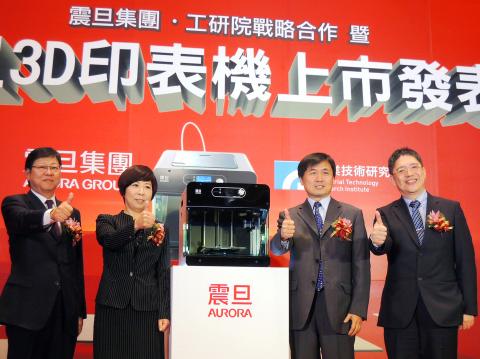Office appliance sales agent Aurora Group (震旦) is aiming to sell its own-brand 3D printers to 200,000 Taiwanese small and medium-sized enterprises, or nearly one-seventh of the total, next year.
The “F1” 3D printer is designed by Aurora and manufactured by automation equipment maker Contrel Technology Co (東捷) using the Industrial Technology Research Institute’s (ITRI) technologies, Aurora said yesterday.
Set to hit the market next month, the F1 3D printer is priced at about NT$100,000 (US$3,400), Tony Tsai (蔡坤明), senior manager of Aurora’s 3D printing business department, said at a product launch event.

Photo: Yang Ya-min, Taipei Times
The price is much higher than the 3D printer made by local electronics conglomerate New Kinpo Group (新金寶集團), which in August said it would begin selling its “da Vinci” printer at NT$15,000 starting this month.
Asked to elaborate Aurora’s advantages in selling higher-priced 3D printers against New Kinpo, Tsai said: “It’s all about the price-performance ratio.”
The F1 also features a user-friendly interfaces to its new product and the firm provides year-long customer service, he added.
Aurora distributes printers for Sharp Corp and Hewlett-Packard Co (HP) in Taiwan and sells Stratasys Ltd’s 3D printers in China. The company also markets office furniture, appliances and supplies.
The company will continue using a business-to-business (B2B) model, rather than a business-to-consumer (B2C) one, to sell its 3D printer, Tsai said.
In a report released in October, market researcher Gartner Inc forecast worldwide shipments of 3D printers that are priced at less than US$100,000 would grow 49 percent to 56,507 units this year.
The figure is estimated to increase 75 percent to 98,065 units next year and rise another 100 percent to about 196,130 units in 2015, Gartner said.
“The 3D printer market is a brand-new market, and we are confident we will hold a notable market share in the long run,” Aurora executive director Alice Lin (林樂萍) said.
After Taiwan, Aurora plans to break into China and then to other overseas markets, Lin said.
To keep up with market trends, Aurora also plans to introduce its own “Aurora Office Cloud” to consumers as soon as the third quarter of next year.
The new could technology service will allow customers to upload and download files to be printed, it said.

Taiwan’s foreign exchange reserves hit a record high at the end of last month, surpassing the US$600 billion mark for the first time, the central bank said yesterday. Last month, the country’s foreign exchange reserves rose US$5.51 billion from a month earlier to reach US$602.94 billion due to an increase in returns from the central bank’s portfolio management, the movement of other foreign currencies in the portfolio against the US dollar and the bank’s efforts to smooth the volatility of the New Taiwan dollar. Department of Foreign Exchange Director-General Eugene Tsai (蔡炯民)said a rate cut cycle launched by the US Federal Reserve

Handset camera lens maker Largan Precision Co (大立光) on Sunday reported a 6.71 percent year-on-year decline in revenue for the third quarter, despite revenue last month hitting the highest level in 11 months. Third-quarter revenue was NT$17.68 billion (US$581.2 million), compared with NT$18.95 billion a year earlier, the company said in a statement. The figure was in line with Yuanta Securities Investment Consulting Co’s (元大投顧) forecast of NT$17.9 billion, but missed the market consensus estimate of NT$18.97 billion. The third-quarter revenue was a 51.44 percent increase from NT$11.67 billion in the second quarter, as the quarter is usually the peak

Nvidia Corp’s major server production partner Hon Hai Precision Industry Co (鴻海精密) reported 10.99 percent year-on-year growth in quarterly sales, signaling healthy demand for artificial intelligence (AI) infrastructure. Revenue totaled NT$2.06 trillion (US$67.72 billion) in the last quarter, in line with analysts’ projections, a company statement said. On a quarterly basis, revenue was up 14.47 percent. Hon Hai’s businesses cover four primary product segments: cloud and networking, smart consumer electronics, computing, and components and other products. Last quarter, “cloud and networking products delivered strong growth, components and other products demonstrated significant growth, while smart consumer electronics and computing products slightly declined,” compared with the

The US government on Wednesday sanctioned more than two dozen companies in China, Turkey and the United Arab Emirates, including offshoots of a US chip firm, accusing the businesses of providing illicit support to Iran’s military or proxies. The US Department of Commerce included two subsidiaries of US-based chip distributor Arrow Electronics Inc (艾睿電子) on its so-called entity list published on the federal register for facilitating purchases by Iran’s proxies of US tech. Arrow spokesman John Hourigan said that the subsidiaries have been operating in full compliance with US export control regulations and his company is discussing with the US Bureau of